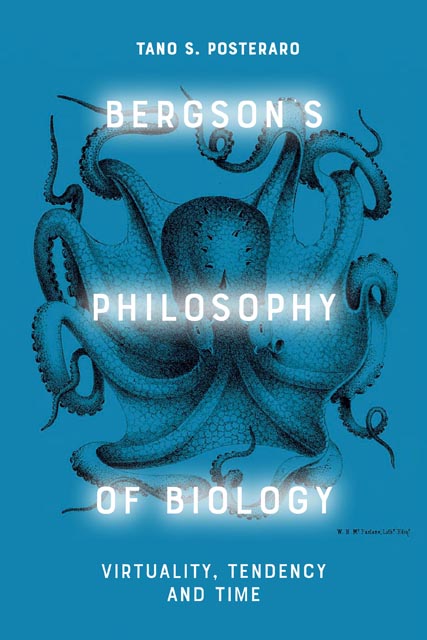Book contents
- Frontmatter
- Contents
- Acknowledgements
- Abbreviations
- Introduction: Between Philosophy and Biology
- 1 The Actual: Mechanism, Finalism, Modality
- 2 The Virtual: Instantiation, Implication, Dynamics
- 3 A Discourse on Tendency
- 4 Individuality and Organisation
- 5 Finalism Inverted
- 6 Canalisation and Convergence
- Concluding Remarks and Future Directions
- Notes
- Bibliography
- Index
1 - The Actual: Mechanism, Finalism, Modality
Published online by Cambridge University Press: 25 October 2023
- Frontmatter
- Contents
- Acknowledgements
- Abbreviations
- Introduction: Between Philosophy and Biology
- 1 The Actual: Mechanism, Finalism, Modality
- 2 The Virtual: Instantiation, Implication, Dynamics
- 3 A Discourse on Tendency
- 4 Individuality and Organisation
- 5 Finalism Inverted
- 6 Canalisation and Convergence
- Concluding Remarks and Future Directions
- Notes
- Bibliography
- Index
Summary
There are a number of ways to begin a text on Bergson's philosophy. The typical tactic is to introduce his theory of time and distinguish it from conceptions of time popular across the history of philosophy and science. Bergson begins his career by uncovering the nature of time, what he calls duration, in lived experience. His philosophy of biology deploys the idea of duration both critically and constructively. Critically, Bergson argues that it is the durational nature of life that the biological sciences deny or obscure. Constructively, it is the durational nature of life that Bergson’s own philosophy of biology aims to capture. I have decided to begin by mapping out the critical elements of his philosophy of biology. That way it is clear what it is that other accounts lack, and what it is that motivates Bergson's own positive philosophy of time. Later, in Chapter 4, I show how the theory of duration as lived time can be interpreted as a component of Bergson's philosophy of biology rather than as its starting point.
Beginning the book by identifying and explaining the critical moments of Bergson's philosophy of biology allows me to introduce some metaphysical terminology I use to develop my interpretation of Bergson’s own metaphysics. I represent Bergson's criticisms as arguments against the metaphysics of ‘actualism’ and ‘possibilism’ in mechanist and finalist biology. Actuality and possibility are modal categories, types of existence. Mechanism relies on a metaphysics of actualism to the extent that it regards determinate organic parts as exhaustive of the phenomena of life. Adaptationism is evolutionary mechanism. Finalism relies on a metaphysics of possibilism to the extent that it assumes that developmental ends or evolutionary events can be given at the outset of the processes that lead to them. The chapter concludes by tracing Bergson's criticisms of these paradigms through some contemporary iterations of actualism and possibilism in gene-based understandings of development and evolution.
Introduction
Much of the argumentation of Bergson's Creative Evolution is critical. The targets of Bergson's criticisms vary between adaptationist or mechanistic modes of evolutionary explanation and finalistic or teleological accounts of evolution and development. The objects of those accounts include the organisation of individual organisms, the source of variation and novelty in the evolutionary process, and the convergent evolution of complex structures such as the eye in cephalopods and vertebrates.
- Type
- Chapter
- Information
- Bergson's Philosophy of BiologyVirtuality, Tendency and Time, pp. 22 - 70Publisher: Edinburgh University PressPrint publication year: 2022



